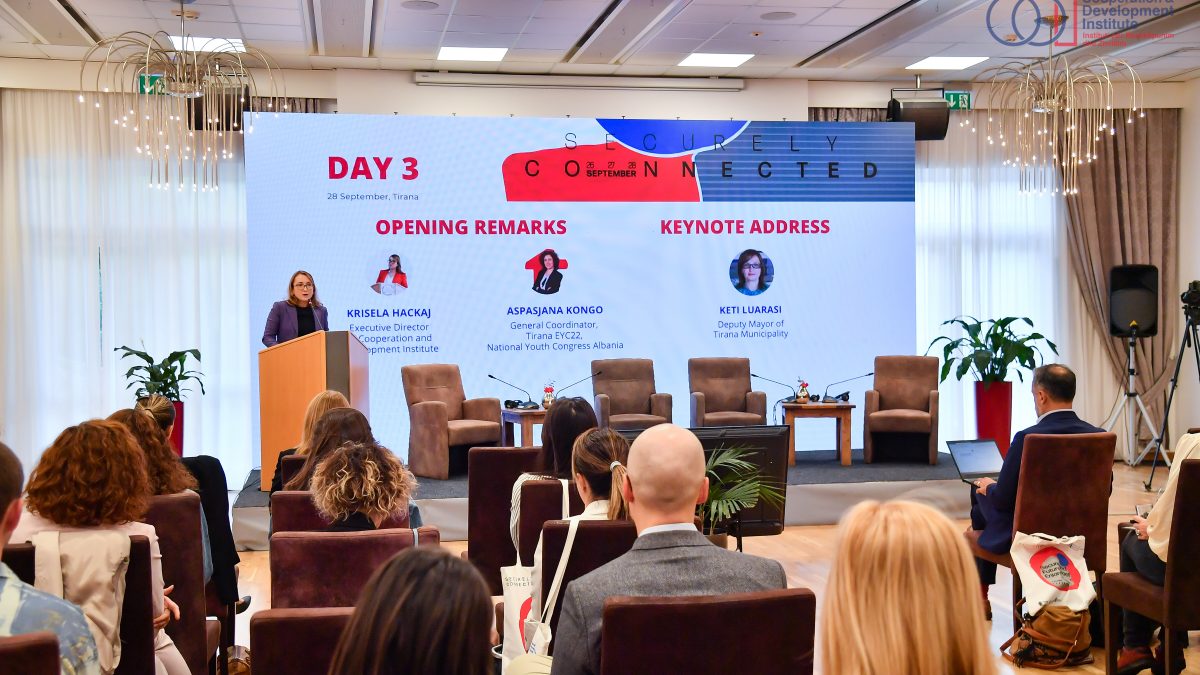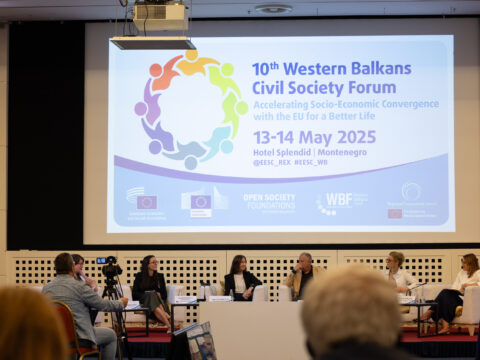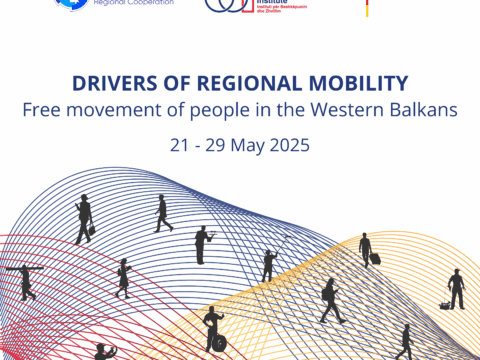1 October 2022
Since the first edition of TCF back in 2015, CDI has always teamed up with young people and involved youth organizations, youngsters, and civil society organizations in every edition of the Tirana Connectivity Forum.
To further contribute to the European Year of Youth and to the Tirana European Youth Capital, we joined forces with the National Youth Congress of Albania and set up joint sessions aiming to enrich the legacy of both titles.
“Secure and future-proof Enlargement is the title we picked up for the 3rd day of TCF22, as we want the Enlargement toolbox to include youngster groups not only as beneficiaries of this process in the future but as shapers and active contributors of EU policies and their programmes today. Only by involving the youngster in all the stages of public policy both at the national, regional and EU levels, policymakers can ensure youth commitment and engagement” stated Krisela Hackaj, Executive Director of CDI in her opening remarks.
This 3rd day was a great example of proving that think tanks and NGO-s can achieve great results by working on joint projects and Ms Aspasjana Kongo, General Coordinator of the Tirana European Youth Capital, enforced this idea by sharing with the audience the successes achieved by TEYC and the features of the good cooperation established between the institutions and civil society.
TCF22 was greeted by Ms Keti Luarasi, Deputy Mayor of Tirana Municipality. She emphasized her institution’s support for youth and their involvement in policy-making, as well as their commitment to future joint cooperation.
The first panel’s main objective was to deconstruct the process of building the Legacy of the title. Part of this discussion was Ms Dafina Peci, Director of the Tirana European Youth Capital, Mr Iount Sibian, President of the Western Balkans Follow-up Committee at EESC, and Tom Matthew, Board Member of the European Youth Forum.
Mr Matthew argued that in general there are very few consultations with young people and the consequences of this are massive, not only for young people but for democracy as well. For this reason, TEYC 2022 is and should be a mechanism that connects youngsters and institutions in the WBs to work together.
Based on data from the actual situation on WB6, Mr Sibian mentioned that adequate budget allocations should be dedicated to including youth organisations, as policies for youth cannot be planned without youth.
Panelists of Panel 5 tried to answer the question “Why should Youth be part of Policy-Making? Mr Tobias Köck, the Vicepresident of European Movement International emphasized the importance of youth vocational and educational training to increase youth employability in different sectors. Ms Angela Angjelovska the representative of the National Youth Council of Macedonia, representing in the panel the work of the Connecting Youth Platform, expressed her concern about the fact that youth organisations are not being heard despite their ability and expertise to help in policymaking. To this end, she presented the main conclusions of the research Paper “Sectoral Youth Employment Opportunities” as a way to contribute to better and more inclusive policies for youth.
Ms Kleina Kasanai, General Director at the Albanian National Youth Agency focused on the concept of connectivity, the keyword of this Forum as well. She highlighted the importance of internal state coordination in order to make the region’s institutions much stronger.
The last panel of this day aimed to present scenarios on co-governance mechanisms that allow youth objectives to be mainstreamed in policy-making. And OPENS was a great initiative from which we could learn a lot. OPENS representative, Vukašin Grozdanović shared his experience in working on how not to let enthusiasm and activities go together with the title. Mr Grozdanović stated that to secure the legacy of the EYC title we should invest in long-lasting programmes which should be carefully planned. Also, moving the programmes to the national level can be a good mechanism to secure the legacy, this proved to be very successful in Serbia after the Novisad EYC title ended.
Ivan Neirotti, Policy Officer at European Youth Forum proposed his suggestions regarding the mechanisms that help youth involvement in policymaking. He emphasized that youth makes a big bunch of soft connectivity and without it, there is no social culture connectivity.
Marco Costantino, from Puglia Region, Youth Policies Department policies, illustrated the best practices from the Youth Policies Department of the Apulia Region, and how this region has indeed advanced with a youth-centered intensive agenda, especially in the creative economy sectors.
The 8th edition of the TCF was supported by Hanns Seidel Foundation, Konrad Adenauer Foundation, Center of Excellence for Maritime Affairs, Heinrich Boell Foundation, Regional Cooperation Council and Tirana European Youth Capital 2022. TCF 2022 is part of the official calendar of the Czech Presidency and of the European Year of Youth.






